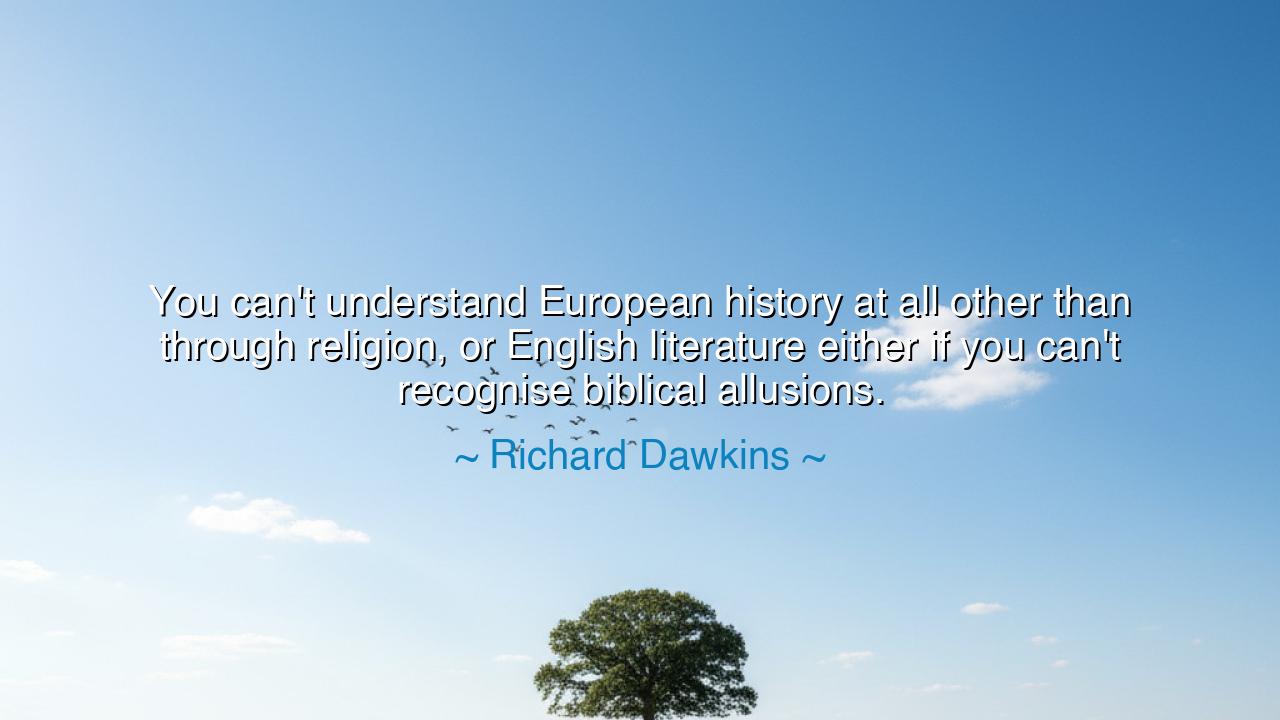
You can't understand European history at all other than through
You can't understand European history at all other than through religion, or English literature either if you can't recognise biblical allusions.






"You can't understand European history at all other than through religion, or English literature either if you can't recognise biblical allusions." These words from Richard Dawkins reflect a profound truth about the inseparable bond between religion and the cultural, intellectual, and literary foundations of Europe. To truly understand the evolution of European history, one must appreciate the central role that religion—especially Christianity—has played in shaping not only the political and social landscape but the very fabric of thought, morality, and identity. From the Roman Empire to the rise of medieval Christianity to the Protestant Reformation, the Bible and its stories have been woven into the language, art, and literature of Europe, shaping not just what people believed, but how they thought, how they acted, and how they viewed the world.
In the ancient world, religion was the cornerstone upon which civilizations were built. The gods and their myths were the foundation for understanding not only the mysteries of the universe but the moral order of society. The Greeks and Romans revered their pantheon of gods and believed that their lives were guided by divine forces. These religions were the framework for their laws, their customs, and their very conception of what it meant to live a good life. In the same way, Christianity became the moral and philosophical bedrock upon which Europe would build its future. The Bible, with its stories of creation, sin, redemption, and salvation, became the source of moral instruction and the guide by which Europeans understood themselves and their relationship with the divine.
Consider the immense influence of the Bible on English literature, which Dawkins highlights in his quote. The works of Shakespeare, John Milton, and Geoffrey Chaucer are filled with biblical allusions, not just because these writers were devout, but because Christianity permeated every aspect of their world. In Milton's "Paradise Lost", for example, the biblical story of Adam and Eve, Satan’s fall, and the Garden of Eden are not just plot points—they are the moral foundation of the narrative. Even the phrase “fall from grace” carries with it the deep echoes of biblical themes of sin, redemption, and the struggle between good and evil. Without understanding the Bible and its profound influence on Western thought, one cannot fully appreciate the richness and depth of European literature and history.
The impact of religion on European history is not limited to the arts and literature but extends to the very shaping of societies. For centuries, the Catholic Church was not only a spiritual authority but a political and cultural force in Europe. The Pope held immense power, influencing kings and emperors, guiding the moral compass of the people, and dictating the laws that governed their lives. The Crusades, the Inquisition, and the rise of monasticism all had their roots in the religious doctrines that governed European civilization. Even as secularism began to rise in the Enlightenment era, the religious foundations remained deeply embedded in European culture and thought.
The Protestant Reformation, which splintered the Catholic Church and gave rise to various Protestant denominations, was another critical turning point in both religious and historical development. Martin Luther’s 95 Theses challenged the religious status quo, leading to decades of religious wars and social upheaval. Yet, the Reformation also played a significant role in shaping the modern world, giving rise to the idea of individual conscience and the importance of personal interpretation of scripture. The Protestant ethic, as famously outlined by Max Weber, emphasized hard work, frugality, and individual responsibility—values that have shaped the capitalist ethos and Western society.
Through this lens, Dawkins' observation is not just about the influence of religion on historical events, but about the profound way that religious ideas have become the underpinning of our cultural language and intellectual tradition. Biblical allusions are so deeply embedded in Western thought that even those who are secular or non-religious cannot escape them. They are part of our shared moral vocabulary, influencing everything from our laws to our literature to our ideas of right and wrong. The language of religion permeates even the most modern and secular debates, often without us even realizing it.
The lesson of Dawkins' quote is that to understand the past—whether it be in the realms of history, literature, or culture—we must understand the role of religion in shaping the world. Religion is not a side issue, but the core of much of human history. For those who wish to understand the depth of European society, it is essential to grasp the religious influences that have shaped it, just as it is essential to understand how these religions have influenced literature and art. To fully appreciate the achievements of Shakespeare or Milton, one must recognize the profound impact of biblical stories and teachings on their work. To understand European history, we must see religion as the very soil from which much of the political, social, and intellectual life of the continent grew.
Thus, let us embrace the wisdom of Dawkins' words and delve into the rich history of religion's influence, knowing that the religious foundations of our societies are key to understanding the complexities of the world we live in. As we study the past, let us reflect on the ways in which religion has shaped not only our thoughts but our societies, our laws, and our culture—and in doing so, gain a deeper understanding of the forces that have shaped our world.






AAdministratorAdministrator
Welcome, honored guests. Please leave a comment, we will respond soon